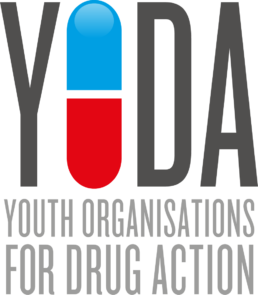This year the first YODA workshops took place in Warsaw and Kiev. Over the last 2 weeks YODA members from 8 countries came together to work on issues affecting young people around cross substance use, LGBT health, drug checking, problematic use and harm reduction. Participants were also able to visit harm reduction and testing facilities as well as checking all the best spots for outreach work.
Read more about the Workshops from YODA member Re Generation [you may need google translate]
Adventure time!
YODA members all work on the ground get harm reduction and health services to those who need it, often the most marginalised and stigmatised in our societies. Site visits showcase the variety of ways organisations work to provide those services. This time, visits included:
Warsaw
- FES-SIN afterparty project
- PREKURSOR drop in centre (and discussion on harm reduction in young people using drugs problematically)
- FES mobile HIV/AIDS/HEP C/STI testing point
Kiev
Workshop Highlights
Identifying and preventing key risks- young people in difficult life situations and blood borne virus infections
Participants were divided into groups. Each group identified education and prevention strategies for vulnerable young people. There were 10 different groups of vulnerable youth to cover. Check the images to see what our experts came up with.
Treatment and prevention of blood borne viruses in member countries: current situation
Our members discussed the current state of services for treatment and prevention of BBV in their own countries. Many countries are in different stages of provision of treatment and prevention services. However, no matter what stage, there is hope: despite difficult sociopolitical situations, it is possible to push for better care of the most vulnerable.
Reflections from some of our participants:
The opportunity to attend YODA training in Warsaw, was very valuable to me, specially in the terms of getting insight into practical part of work of PREKURSOR Drop in Center and Foundation for Social Education mobile unit. Exchanging of experience and knowledge with more experienced activists in harm reduction programs improved my skills in harm reduction and provided me with many ideas which can be implemented in Montenegro regarding harm reduction for young people using drugs, specially within some vulnerable groups, such as young LGBTIQ people, sex workers or people who are members of ethnic minorities.-Džoli Ulićević, Montenegro, Juventas
For me the most useful most useful and most practical was the „site visit“ to mobile testing unit in district of Old Praga, known by continuant and problematic use of drugs as well as risky surroundings affecting the public health situation in the mentioned area. The Foundation for Social education (FES, i think its what its called) has fully equipped van for free testing for HIV, HEP C and various STIs, and they offer it free of charge, and we used the opportunity and tested ourselves as well– Ognjen Martinović, Serbia, Regeneration
In addition to organisations we visited in Ukraine, we heard that there a more organizations that are in some way are dealing with the issues related to drug use and support to drug users, which shows serious understanding of the problems that come with it regarding public health and human rights situation. What we have seen and learned there we should advocate to our countries, more specifically Western Balkans and Serbia, emphasizing that even Ukraine in the complicated political situation can find way to support harm reduction services as a one of the key answers to prevention of Hep C and HIV, while in Belgrade city of aprox 20. 000 injecting drug users, we don’t have any organization offering that kind of support, while Re Generation remains the only organization advocating for harm reduction services .-Vladana Stepanović, Serbia, Regeneration
This project was funded by the European Commission funds under the Erasmus+ programme. This post reflects the position of its authors only, and European Commission or Erasmus+ National Agency are not responsible for its contents.




